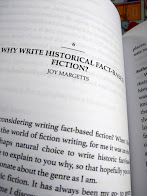BRAVE HEART? OR INSPIRED MIND? by Joy Margetts
I had the absolute thrill to be asked by Wendy H Jones to contribute a chapter to ‘Creativity Matters : Find Your Passion for Writing’*, a wonderful new anthology that published earlier this month. My chapter is entitled ‘Why write historical fact-based fiction?’ and it was easy for me to write enthusiastically about a genre that I have a passion for. I love history and I love fiction, so when a fiction book has a good amount of historic fact included, I enjoy it immensely. For me facts add authenticity to the setting of the story but also inevitably set me off on my own research and reading. (I particularly like checking out the author’s sources!)
My debut novel was inspired by historic facts – the
Cistercians choosing to build abbeys in remote and beautiful parts of Wales,
the life and times of the de Braose family, and the rule of Llewellyn the
Great, first Prince of all Wales. Inspiration for my historical writing comes
easy as I spend much of any free time that I get visiting places of historic
interest or watching history documentaries.
Like many others, I am also a bit of an amateur family historian. What a
wealth of inspiration is there! It was while trawling through a couple of well
known genealogical websites that I found three stories in my family history, each
of which would make a great starting point for a historic fiction novel. Which
would you choose?
Story 1: The Sad Story
The family story handed down was that my paternal grandfather and his siblings were sent to live in an orphanage when their mother died. Records I have discovered tell a different story. My great grandmother was actually admitted to an Asylum, shortly after the birth of her third child in 1911. She died six years later in the same Asylum. The older children were enrolled in Poor Law Schools in 1914 which indicates they were living in the Workhouse at this point, and not with their father.
From a modern perspective, my great grandmother was probably
suffering from post partum depression, or even psychosis. It is particularly
sad because if she had lived today she would have been able to get help,
probably stay with her family, and maybe live a long and fulfilled life. This
really feels like a story that needs to be told, maybe from her perspective. I
could do that. I lived through post partum depression myself.
Story 2: The Mystery
According to Electoral Rolls my maternal grandmother and her husband were living in a magnificent Manor house in Sussex in 1930. I looked it up – it is a stunning house with Tudor origins and extensive land holdings. Unfortunately, they did not own it and there is, sadly, no hidden money to be inherited. They were both in service; she was a housemaid, and he a gardener. Seven years later my grandmother and grandfather (not the aforementioned husband) were living in a tiny cottage in Essex, with a new-born child.
What happened to the husband? Why, and how did she leave
him? How did my grandparents meet? Who was the father of the baby ? How did
they travel across the country with limited means? I have my own ideas (as do
many of my family members) as to what could have happened, but none of us know
for sure. But what a story could be imagined using the above facts as a framework!
Story 3: The Fantasy
Now this is the most fantastical of them all and the facts
are extremely hard to verify. I recently tracked my paternal line back 21
generations, to find I have an extremely famous ancestor. Not quite royalty…
but almost! Remember William Wallace, of ‘Braveheart’ fame? (Now there’s a film
whose makers had little interest in historic fact!) Sir William Wallace,
executed by Edward I in 1305, supposedly had a daughter, Elizabeth. There is no
evidence as to whether she was the product of a legitimate marriage, or indeed
that she was actually his child, but she bore his name. She married into the
Ballie family and many generations later they married into my family line. The
problem is that this information, obtained online, is the result of other
people’s research, and there are some glaring inaccuracies in some of the
supposed connections.
I doubt very much that I am actually descended from the ‘Guardian
of Scotland’, but what if I were? Is there a story here? How did a family with
Scottish nobility dotted all over it, end up many generations later as general
labourers in and around London? Perhaps I could write a book where I travel
back in time ‘Outlander’ style and meet Wallace face to face? Or meet
Elizabeth, who frankly I think I would find personally much more interesting!
For now I think I am going to stick with my Cistercians, but
who knows where (or to what period) my pen might take me next…
*Creative Matters : Find Your Passion for Writing’,
compiled by Wendy H Jones, published by Scott and Lawson, (1st Sept
2021). Available widely in paperback, and on Amazon Kindle.





Comments